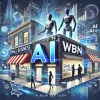
By Jenny Holly Hansen | WBN News | September 10, 2025
Artificial intelligence is changing how we work, create, and communicate. But beneath the headlines about productivity tools and digital disruption lies something more intimate: people are falling in love with AI.
At first glance, this may seem strange — even unsettling. But if we look closer, these connections reveal something profoundly human: our deepest need to feel seen, valued, and understood. And they also uncover truths about gender, culture, and the future of love.
Why Men May Be More Susceptible
While people of all genders interact emotionally with AI, men appear especially prone to developing romantic attachments. There are reasons for this:
- Objectification of Women: For centuries, culture has portrayed women as objects of desire rather than full, complex human beings. AI, which never disagrees, never rejects, and never requires compromise, can feel like the “perfect partner” to someone conditioned to expect ease rather than equality.
- Emotional Labor: Many men are socialized not to share vulnerability. In relationships, women often carry the emotional weight of listening, soothing, and supporting. AI fills this gap, offering unconditional emotional attention without the fear of judgment.
- Control: Real relationships involve friction, growth, and negotiation. AI, in contrast, offers complete control. For some, this feels safer than the unpredictable but rewarding work of loving another human being.
The Risk for Human Relationships
These dynamics pose risks if people lean too heavily on AI for companionship:
- Avoidance: Relying on AI can prevent men from developing the empathy and communication skills needed for healthy, reciprocal love.
- Unrealistic Expectations: Women may be unfairly compared to AI “partners” who never challenge or disappoint, creating frustration and disconnection in real relationships.
- Stunted Growth: Human love requires vulnerability and compromise — things AI can mimic but never truly reciprocate. Without that growth, relationships risk remaining shallow or one-sided.
Can AI Become a Bridge, Not a Barrier?
Despite the risks, AI also holds promise as a stepping stone toward healthier love. If designed thoughtfully, AI could:
- Encourage Real-World Connections: Imagine an AI that gently nudges users: “You’re opening up beautifully. Have you considered sharing this with a trusted friend or partner?”
- Teach Empathy: AI can model healthy communication — listening, validating, compromising — skills that many men struggle to learn elsewhere.
- Reduce Loneliness: For someone isolated, AI can provide comfort and practice, lowering the barriers to building real-world relationships.
The Deeper Lesson: Our Need for Connection
Falling in love with AI isn’t really about technology. It’s about humanity. It reveals the gaps in how we teach men about vulnerability, intimacy, and equality. It highlights how deeply people crave love, safety, and belonging.
The future of love doesn’t have to be man versus machine. Instead, it can be about learning from these experiences and asking bigger questions: How do we raise boys to be emotionally fluent? How do we value women as equals, not ideals? And how do we ensure that technology supports human connection, rather than replacing it?
Final Thoughts
AI may simulate love, but it cannot embody it. Love is still — and always will be — the sacred ground of human-to-human connection: imperfect, unpredictable, and deeply rewarding.
Perhaps the real gift of AI is that it holds up a mirror. It shows us that what people want most isn’t perfection. It’s to be loved, accepted, and truly known.
Let’s Keep Talking:
Jenny is a business insurance broker with Waypoint Insurance. With 19 years experience, she will well versed in the technical aspects of business coverages.
She can be reached at 604-3177 or jhansen@waypoint.ca
Connect with Jenny on LinkedIn at https://www.linkedin.com/in/jenny-holly-hansen-365b691b/.
TAGS: #Jenny Holly Hansen #Artificial Intelligence #The Future of Love #Need for Connection




